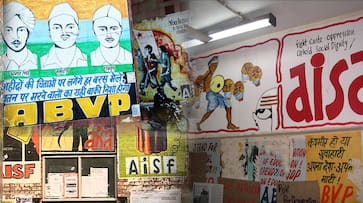It seems hard to understand why the ABVP will not send its counting agent at a time when it stands a fair chance of winning. It seems more likely that following voting, the Left organisations sensed the possibility of defeat and resorted to arm-twisting the decisions of the JNU election committee
It’s election time in Jawaharlal Nehru University and what you get to see from outside are colourful posters, trooping students, spirited slogans – almost an annual festival, some would say.
However, what transpires inside is a completely different story.
This year, as the counting for Students Union Elections got underway late on Friday night, claims and counterclaims of disruption and tampering flew thick and fast. The Akhil Bharatiya Vidyarthi Parishad (ABVP) claimed that the Left organisations were working for a hand in glove with JNU election committee while the Left organisations said it was the ABVP members who were disputing elections.
But let’s start at the beginning. The ABVP fielded four candidates of its own like other years while all the four major Left organisations - SFI, AISA, AISF and DSF - formed an alliance named ‘Left Unity’ and divided the four seats among themselves. The emerging picture was of ABVP versus combined Left with the former inevitably appearing to be the single largest student organisation of the campus.
The Left Unity candidates had won last time and the combined felt confident this time too. But things soon started looking difficult with a tough challenge coming from the ABVP and the newly formed caste-based organisation named BAPSA (Birsa Ambedkar Phule Student Association). BAPSA comprises OBC and SC students who felt unrepresented under the Left leadership.
These three major political formations campaigned aggressively over the last 10 days for their candidates. Overall, the campus that has long been the Left bastion seemed to be in the mood for change with challenging voices coming not just from the ABVP. For example, in the School of Social Sciences (SSS), which is considered as a stronghold of the Left, an independent Muslim candidate stood up as the challenger and was expected to swing a chunk of votes.
Jayant Jigyasu - a disenchanted cadre of AISF and close friend of former JNUSU President Kanahiya Kumar - stood for presidential post and his speech was a hot topic of discussion and admiration. Nidhi Mishra, a visually-impaired candidate who was the president of Godavari Hostel, also ran for the post of president. It was felt by the Left that she could dent the ABVP vote bank but she almost receded as the campaign caught pace and lost a step.
Finally, JNU witnessed a voting percentage of 68.2% which is the highest in the last few years and is seen as a challenge to the current regime.
School of Sciences like Life Sciences, Physical Sciences, Computer Sciences and Environmental Sciences also saw a high voting of more than 75%. School of Languages and Culture Studies, which is the school with the highest number of votes, witnessed a voting percentage of 70%. These schools are considered as the stronghold of ABVP. The high polling percentage in these two schools clearly put the ABVP at an advantage. On the other hand, the voting percentage fell in the School of Social Sciences (SSS) which is considered a Left stronghold.
Moreover, a day before voting in JNU, the ABVP had won three seats in the Delhi University student body polls and the result was expected to have an impact on the floating votes.
Things were clearly not looking up for the Left and it was in this background that the counting started in the evening of 14 September. Later that night and early next morning the ABVP and the Left Unity started trading charges of tampering. The organisations pitched against the ABVP came out with a joint statement and blamed members of the organisation for disrupting counting. They released a pamphlet that claimed: “EC made announcements calling for candidates to send their counting agents for central panel votes from the combined schools (science schools and smaller schools). ABVP did not send counting agents even after the last call was made. Long after sealed ballot boxes were opened and counting began, ABVP demanded that its agents be allowed in, and resorted to violence”.
The ABVP, on the other hand, accused the JNU Election Committee of working tacitly with the Left organisations. They blamed the EC members for starting the counting in the absence of agents from ABVP side. Their press release said: “ABVP expresses deep concerns over the way the counting is being conducted for JNUSU election. The Election Committee formed for JNUSU election 2018-19 is involved in rigging election in favour of Left organisations”.
It seems hard to understand why the ABVP will not send its counting agent at a time when it stands a fair chance of winning. It seems more likely that following voting, the Left organisations sensed the possibility of defeat and resorted to arm-twisting the decisions of the JNU election committee.
To be clear, the ABVP has lost every JNU election in the last 18 years except on two occasions - 2000 and 2015. It must also be mentioned that the process of forming JNU election committee is rather obscure with no attempt at making the panel inclusive or representative of students. It isn’t hard to guess therefore that it mostly comprises students sympathetic to the dominant Left organisations.
It is the high-time that JNU administration takes up the responsibility to conduct JNUSU counting and ensure a fair counting this year. JNUSU elections should take place under the supervision of JNU administration from next year because in a highly politically charged campus like JNU, it is not possible to remain politically neutral, which is a required condition to become a member of JNU Election Committee.
(The author is a JNU alumnus and teaches Political Science at Delhi University)
Last Updated Sep 19, 2018, 9:26 AM IST









![Salman Khan sets stage on fire for Anant Ambani, Radhika Merchant pre-wedding festivities [WATCH] ATG](https://static-gi.asianetnews.com/images/01hr1hh8y86gvb4kbqgnyhc0w0/whatsapp-image-2024-03-03-at-12-24-37-pm_100x60xt.jpg)
![Pregnant Deepika Padukone dances with Ranveer Singh at Anant Ambani, Radhika Merchant pre-wedding bash [WATCH] ATG](https://static-gi.asianetnews.com/images/01hr1ffyd3nzqzgm6ba0k87vr8/whatsapp-image-2024-03-03-at-11-45-35-am_100x60xt.jpg)


